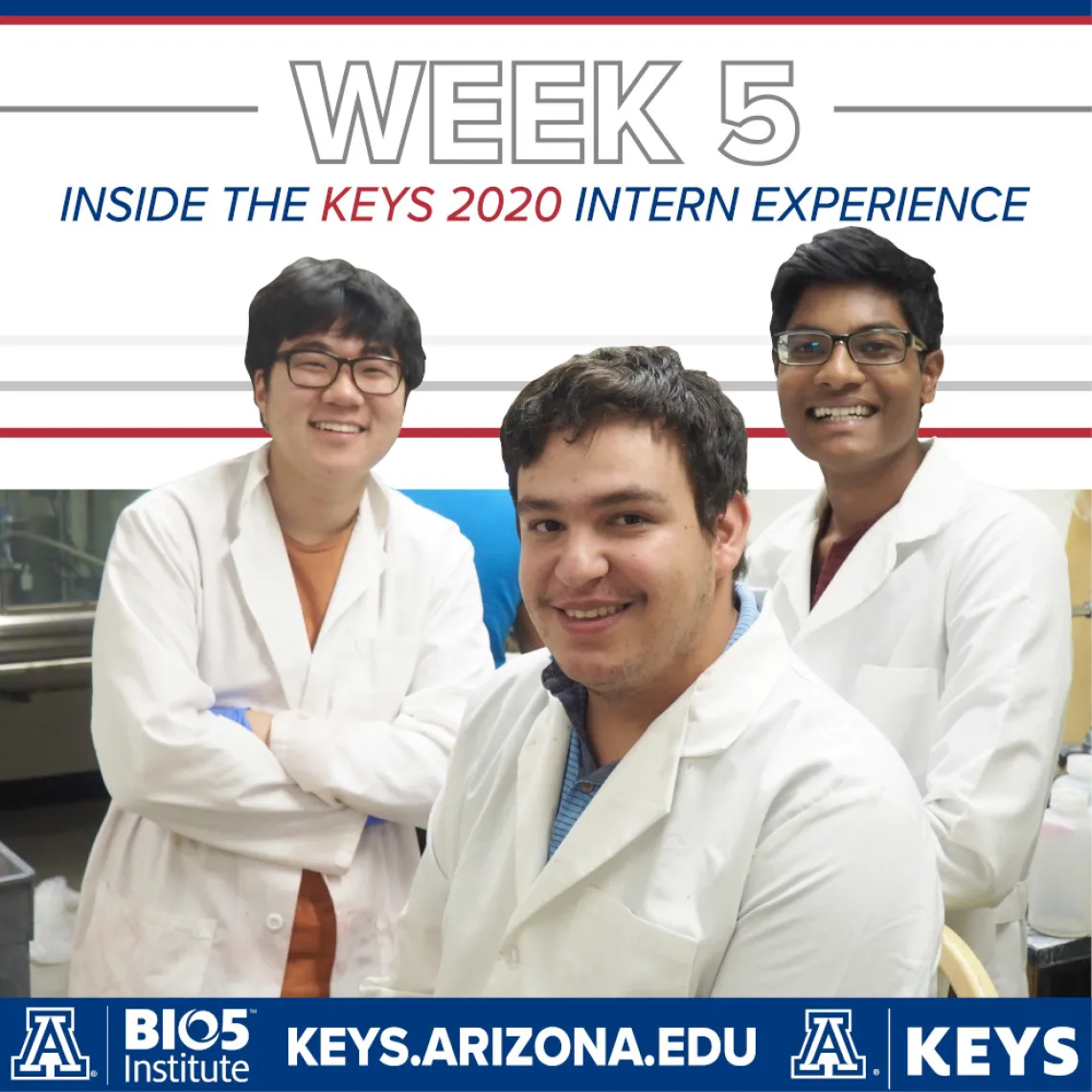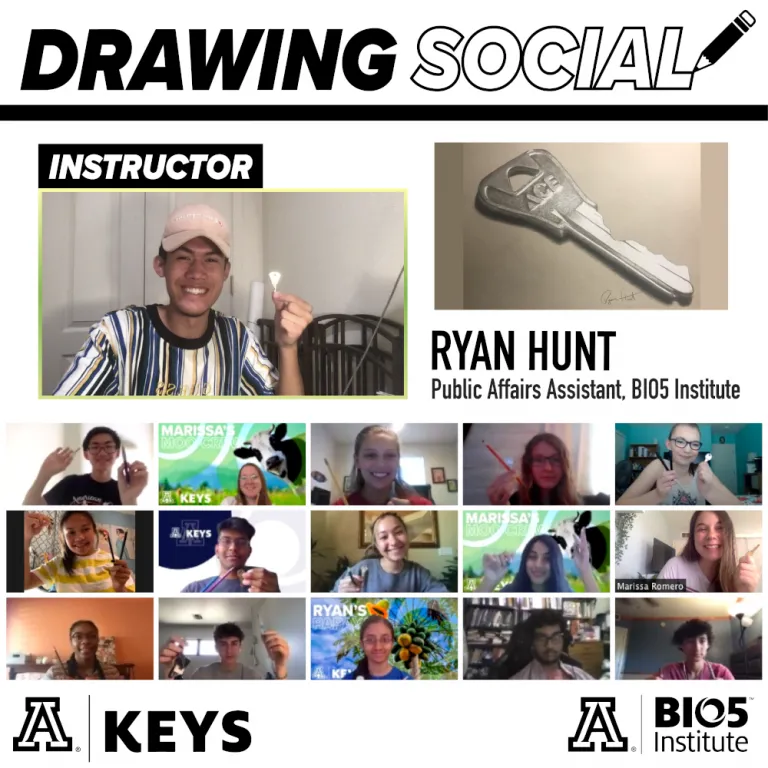KEYS Check-In – Week 5
Follow along with four interns during their fifth week participating in the KEYS virtual research internship program.

Time has been flying by for the forty-nine Arizona high schoolers participating in BIO5’s Keep Engaging Youth in Science (KEYS) Research Internship. Having just completed the fifth week of their seven-week remote research experience, interns have just one more full week of research before they virtually present their findings to their peers, mentors and families.
Students began to wind down their projects and turn their attention to their presentations this past week. KEYS co-coordinator Brooke Moreno has been working with each student on their elevator pitch – a 30-second research snapshot that excludes technical jargon.
“It’s really hard to take everything you’ve learned in six weeks and say it in 30 seconds,” said Esha Mathur, an intern in the lab of Dr. Bonnie Hurwitz who is studying viruses, bacteria and mosses. “But one of the mains things Brooke has told us is that you have to tell your audience why your research is important. Otherwise, no one is going to care.”
Interns practiced these elevator pitches in their smaller KEYS Crew meetings. KEYS Crew leader Marissa Romero said the goal is for the students to memorize their speeches but deliver them without appearing scripted.
Not only are students juggling their research and elevator pitches, but they are also working on scientific posters, which will feature an introduction on the project, as well as the student’s hypothesis or research goal, data science methods, results and conclusions. Though students will include more detailed information on their poster than in their elevator pitch, they must still address the challenge of succinctly communicating a large amount of information through the limited space on a poster without overwhelming their audience.
“One of the biggest things I’ve gotten from this KEYS internship is learning that you can convey the same message in a more concise way,” said Nik Mathur, an intern who is studying cancer migration in the lab of Dr. Pascale Charest.
Nik plans to apply this lesson in brevity to his schoolwork in the coming year, as he now realizes he can write shorter essays without altering the content by more carefully choosing his words.
Nik and Esha’s sister Sonia, an intern in the lab of Dr. Leif Abrell, is most excited about the aesthetics of her poster. She’s been spending the past few days creating visualizations that depict the relationship between rainwater contamination and the sampling season, year and community. Sonia is finding the best way to assemble the pieces and add splashes of color so that her poster is both informational and exciting to view.
In addition to refining elevators pitches and designing posters, interns are also creating slideshow presentations. Though KEYS interns have traditionally presented posters at an in-person KEYS Showcase, this year’s class will give slideshow presentations on their projects through the Zoom videoconferencing platform.
“They’ve got a lot on their plates!” said Romero.
Personal growth
“This week has been tough,” said Christina Niyigena, an intern in the laboratory of Dr. Michael Marty.
Having completed her first project last week in Python, Christina has shifted to wxPython, an extension used to create graphical interfaces. When complete, her interface will feature numerous buttons, checkboxes and text boxes, and will be incorporated into Dr. Marty’s UniDec data analysis software.
Though she easily learned from online tutorials for her first project, Christina said this assignment isn’t as intuitive. Early in the week Christina realized she needed more help from her mentor but had a difficult time giving herself grace because she felt she was lagging behind the progress of her fellow interns.
“I’m an individual, but sometimes it is hard to stop comparing yourself to others,” she said.
Despite worrying about living up to the expectations of her mentors and the bar set by her peers, Christina garnered the internal strength to confess that she was quite lost in her new project. Dr. Marty reminded her that this internship is all about learning, not about the quantity of code that she produces in comparison to her peers.
“Dr. Marty told me the whole point of this project is to learn,” she said. “It’s very refreshing to not worry about being at the same pace as the other students.”
These reassurances sparked a transformation within Christina, giving her the confidence to continue to ask for help and focus more on her successes as opposed to comparing herself to others’ accomplishments.
Inspiring the next generation
The students were treated to two seminar speakers this week. Though initially scheduled to present during training week, Dr. Ramona Walls, Senior Science Informatician and CyVerse Research Associate, had to reschedule her presentation for this past week because she had to evacuate her home due to the Bighorn Fire.
CyVerse is a dynamic virtual organization that provides life scientists with powerful computational infrastructure to handle huge datasets and complex analyses, thus enabling data-driven discovery. Dr. Walls shared her work on initiatives related to data management and integration, as well as how she supports users throughout the “data lifecycle.”
Dr. Jil Tardif, professor of medicine and cellular & molecular medicine, discussed her nearly two-decade long journey to becoming a physician-scientist. As a researcher, Dr. Tardiff studies the causes of the most common form of genetic cardiomyopathy, or disease of the heart muscle, which affect one in 500 individuals of all ages and represent the most common cause of sudden cardiac death.
Christina, who desires to pursue a career in medicine, said Dr. Tardif was “inspirational.” Like Dr. Chapman’s message last week, Christina was especially moved by Dr. Tardif’s message of career flexibility. The physician-scientist told the students they need to be patient and take time to pursue different subjects and opportunities. Only once they have explored all their options can they find a career that excites them to get out of bed each morning.
“She really highlighted the point that you really have to have a passion for what you’re doing,” Nik said. “She conveyed the message that when you’re searching for a job, you have to find a subject that you’re extremely passionate about, something that when you wake up every morning, you’re excited to do and it doesn’t seem like a burden or something you stress about.”
All four students said Dr. Tardif’s message was moving. Many of them are still unsure of their future career plans, let alone what they will study in college in the coming years, but they now will navigate those decisions with more curiosity and exploration.
Weekly socials
Friendship, fun and creativity were reinforced this week through two socials. The KEYS Crew hosted a game night Tuesday, and Crew leader Ryan Hunt led the students in a drawing social on Saturday.
Missed what happened during the first half of the KEYS program? Get the backstory on these four interns and their projects, and read about their progress during Week 3 and Week 4.
About KEYS
The KEYS program is led by the BIO5 Institute and is funded by BIO5 and generous supporters including individuals, families, companies, foundations and various UArizona faculty, colleges and departments. The Technology and Research Initiative Fund (TRIF) that helped launch BIO5 almost 20 years ago continues to be a catalyst in enabling effective, cross-disciplinary bioscience research, innovation and impact at the University of Arizona, and enables world-class student engagement programs like KEYS. For additional information about the KEYS Research Internship Program, email keys@bio5.org(link sends e-mail).
About the University of Arizona BIO5 Institute
The BIO5 Institute at the University of Arizona connects and mobilizes top researchers in agriculture, engineering, biomedicine, pharmacy, basic science, and computational science to find creative solutions to humanity’s most pressing health and environmental challenges. Since 2001, this interdisciplinary approach has been an international model of how to conduct collaborative research, and has resulted in disease prevention strategies, promising new therapies, innovative diagnostics and devices, and improved food crops. For more information, visit BIO5.org.

Ryan Hunt, KEYS Crew Leader and BIO5 Public Affairs Student Assistant, taught the interns to sketch a key during a drawing social on July 11.

